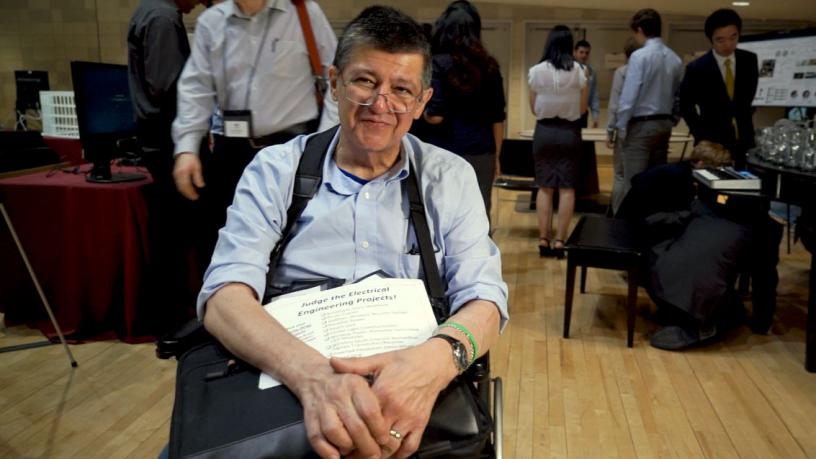In Memoriam: Fred Stolfi (1951-2019)

Fred Stolfi, senior lecturer in mechanical engineering, passed away on November 30. Over his more than 16 years at Columbia as a lecturer and adjunct associate professor, he taught many classes and mentored hundreds of undergrad and graduate students.
“Fred left an indelible mark on our students and our department through his mechatronics course,” said Jeffrey Kysar, professor and chair of mechanical engineering. “He developed the course more than 15 years ago and it has been a favorite for many of our undergraduate and graduate students. In addition, Fred was very passionate about student advising and student clubs, as well as about undergraduate education in general. He will be deeply missed.”
Stolfi’s passion was mechatronics, a branch of engineering that combines both electrical and mechanical systems. “Mechatronics is the synergistic combination of mechanics, electronics, and computer systems to create simpler, more reliable, and versatile products and systems,” Stolfi explained to an interviewer a year ago. “Today, mechatronic systems are everywhere, from toys, washing machines, coffee makers and cars to computer hard drives and robotic assembly systems. My goal is to challenge students to use their creativity and problem-solving skills to design highly integrated mechatronic products that will simplify and enhance our everyday lives.”
Stolfi worked for more than 25 years in industrial research as a mechatronics engineer for Xerox, N.V. Philips, and SCM Corporation. At Xerox, he designed advanced control systems for copiers and printers and for advanced products and internal factory automation systems. At Philips, he was the project leader for a NASA sponsored state-of-the-art cryogenic refrigerator for spacecraft use.
He joined Columbia Engineering first as an associate adjunct professor in 2002 and then as a senior lecturer in 2009. He regularly taught two mechanical engineering classes: Mechatronics & Embedded Microcomputer Control, and the Senior Engineering Capstone class.
“In the laboratory-based Mechatronics class, we use a case study approach to teach students how to develop products and systems in which mechatronics is considered from the very start of the design process,” Stolfi said. “It’s an open-design class, in which students are free to create the product or system however they like, as long as it meets the end-goal specifications for the case study.”
In the Senior Engineering Capstone class, students develop a unique and original product design. “The students have come up with some amazingly innovative products, such as a cold brew coffee maker, a snake-type robot that travels inside human veins, and a manipulator device for the da Vinci surgical robot,” Stolfi noted. “Many of their ideas are patentable, and we encourage them to pursue that process.”
Stolfi always hoped that his classes would spark students’ intellectual curiosity and launch them into engineering careers. “I tell my students that in the engineering industry you have to present and defend your ideas,” he observed. “I want them to come to the industry with a passion for creating simple designs to solve complex problems, and with their creative spirit intact.”
Jeff Malins ’03 was a senior in Stolfi’s first Mechatronics class, and was the 2003 SEAS Salutatorian. Now Chief Product Officer at Curisium, a healthcare software startup in Los Angeles, he remembers Stolfi fondly: “My most vivid memory of Fred is when he told me that if I worked for him, a piece of code I submitted would fail his design review. I objected that it was 10x faster and more efficient than the examples he'd given in class. He said yes, it was extremely impressive, but over-optimized, and that the next engineer to look at it won’t be able to make heads or tails of it. That one comment shifted my entire perspective on engineering as a profession. I’ve since gone on to manage multiple engineering teams and that lesson really mattered—I still draw on it to this day.”
Stolfi attended Fordham University, Bronx, NY, and graduated with a BA degree in mathematics (cum laude) in 1972. He received a MS in 1976 from Rensselaer Polytechnic Institute (RPI) and his professional degree of engineer in electrical engineering in 1988 from Columbia. He received his PhD in mechanical engineering from RPI in 2001.
